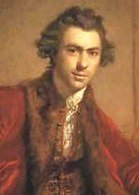After being dismissed from the Mermaid Tavern, Windsor for fighting, they moved to central London. While seeing the sights they lodged with Mr. Arne, an undertaker in King street by Covent-Garden, who'd been recommended to them by four chiefs who had visited Britain twenty years before.

In English dress, walking in St. James's Park.
3 October - Daily Journal
Yesterday about 8 o’clock in the morning the Indian Chiefs set out from their lodgings in King-Street, Covent-Garden, for Portsmouth, where they will go aboard his Majesty’s Ship the Fox, Capt. Arnold, which is to carry them to Carolina.
We are told that on Tuesday evening last, when the time of their departure drew near, Oukah Ulah, the Chief of them, expressed a great inclination to stay with Sir Alexander Cuming; and when Sir Alexander told him that it would not be proper, he wept, and said he should mourn always till he saw him again, and that he had not slept for three nights, but walk’d about the streets, for thinking on parting with Sir Alexander, for whose sake he had left both his wife and children.
But Sir Alexander telling him, that he would be of more service to his Majesty King George and the English, by returning to his own country, he answered, That as Sir Alexander desired it, he would do as he bid him.
Although they reached Charleston safely in mid-December, they arrived in the middle of a war between the Cherokees and the Americans which delayed their return home.
 Short hair (with naval uniform beret):
Short hair (with naval uniform beret):




 Below, we see the process in action on the countess herself, and the tongs (often heated in a small portable brazier) which are used to fix the curl.
Below, we see the process in action on the countess herself, and the tongs (often heated in a small portable brazier) which are used to fix the curl.



